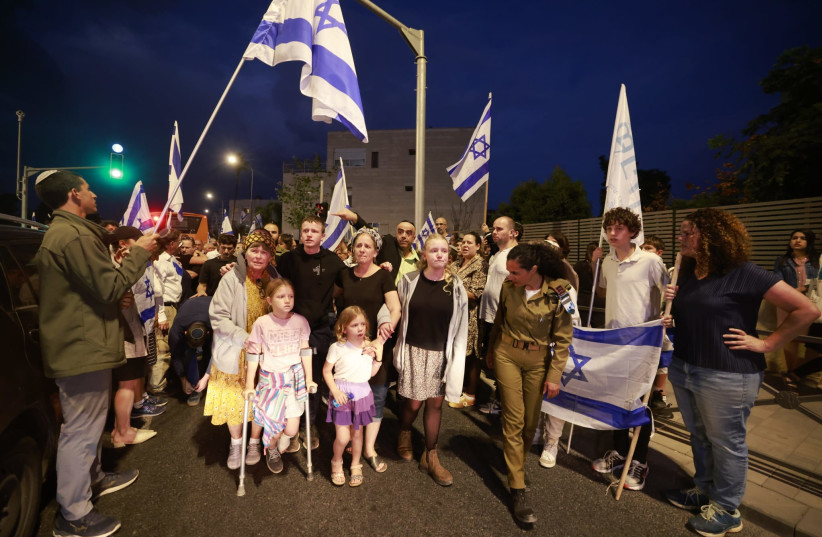Yossi Hershkovitz, of blessed memory, was one of those special educators. The ones you just know will have an indelible mark on each and every student with whom he comes into contact. Indeed, according to Shlomo Weil, his colleague and partner at the Ort Pelech Boys School in Jerusalem, Yossi not only affected the lives of his pupils, but those of his staff and colleagues as well.
Literally hours before falling in battle on Friday, Yossi sent a message to his students, now virally spreading to much larger circles in Israel – “Don’t say bad things about Am Yisrael. There are no lefties, righties, no haredim, just Jews.” His final message was not about fighting or the enemy, but our inner strength and solidarity.
Aged 44, Yossi was exempt from serving as a reserve soldier in a combat unit. He volunteered anyway. What then was the drive for him and so many thousands of reservists to heed the call immediately following news of the October 7 atrocities and rush into harm’s way?
Old-new ethos
Historically, serving in the IDF is part of the core ethos of Israeli society. For many years, one’s army service was the key entry ticket into Israeli society. The IDF fulfilled a role in the Jewish State beyond purely security considerations. But in the last decade or so, this has changed for a range of reasons.
Israel and Israelis have felt a sense of existential safety, a distant possibility in the early decades of the country’s existence. With its strategic military edge, in hardware, technology, and manpower, Israelis have come to take national security largely as a given, more Start-Up Nation than a society built around “Army builds people, builds army,” an expression coined by MK and former IDF general Elazar Stern.

Which Israeli has not dreamed that their children would not need to serve in the army, or if they would, it would be in relative peace? We are truly a people that seeks to defend itself, rather than aspiring for military might or conquest. Israelis are not Vikings or a warrior nation.
People’s army or professional army
There is a second underlying factor that has changed over the years. From an assumption that the IDF can only fulfill its role of defending Israel based on broad conscription, there has been a shift in public opinion toward a smaller, professional army resourced only by volunteers. This is driven on the one hand by a perceived drop in motivation to serve in combat units (in favor of cyber and other intelligence and technology units) and the ongoing social tension surrounding the fact that 90% of the haredi population do not serve at all.
Just three months before the war with Hamas, Shmuel Rosner published research on the question of whether the transition to a professional army could be a solution to the problem of conscription. Although a small majority of the Jewish population of Israel thought it a bad idea, 60% of those who support the coalition and 80% of haredim were in favor of the solution. Surprisingly to me, even a small margin of religious Zionists thought it a good idea.
Since October 7, this under-researched and frankly, populist notion has been cast into the rubbish bin of bad ideas. The huge call to arms of reservists was required in order to fight a ground war with Hamas and be ready for any developments on the Lebanese border. Those same events have laid bare the requirement for a larger and longer serving army, both standing and reservist, in any new post-war security paradigm.
The conduct of the war will lead to a return to tried and tested human-based defenses alongside technology, and a new-found respect for tanks, artillery, and the heavy equipment of the engineering core. I have seen unpublished research showing that a clear majority of the Israeli public already understands that this need for increased investment in security will be at the expense of other government services and investments.
New-old ethos
Hamas use schools and hospitals to hide terrorists and terror infrastructure. Israel relies on school principals and doctors to don uniforms to defend its people.
Yossi Hershkovitz never lost sight of the thing that too many of us had begun to take for granted. Israel’s people’s army is not just about numbers, but about the spirit of the soldiers defending the people and the ethos of personal sacrifice for the greater good. It is also the power of the reservist army, on the ground and in the air, balancing the power of politics, without ever posing a threat of a military takeover. Hamas uses its forces to terrorize Palestinians and carry out unspeakable atrocities on Israelis (Jew and Arab, secular and religious) whereas the IDF is of the people and by the people.
Along with many other changes forced on Israel by Hamas’s attack on October 7, the idea of a smaller volunteer army will disappear. Obviously, the festering question of who enjoys the privilege of conscripting and who does not will not disappear. We can only pray that a new sense of collective fate will bring other positive changes to solidify our sense of collective destiny.
Yossi’s students and colleagues will cry for the loss of a great educator, but they will also know that Yossi, along with the other heroes who have given their lives, will stand tall forever as an inspiration, reminding us of the purpose of the People’s Army, not just for those who serve in the IDF, but for everyone involved in rebuilding Israel and its ethos in their image.
The writer is a founding partner of Goldrock Capital and the founder of The Institute for Jewish and Zionist Research. He is a former chair of Gesher, World Bnei Akiva, and the Coalition for Haredi Employment.
